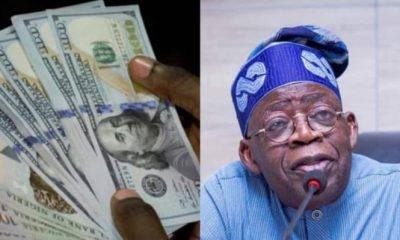
News
Tinubu Proposes N6.2 Trillion Boost to N27.5 Trillion 2024 Budget
In a significant move aimed at bolstering Nigeria’s economic landscape, President Bola Ahmed Tinubu has proposed an injection of N6.2 trillion into the existing N27.5 trillion 2024 national budget.
This bold step underscores his administration’s commitment to driving growth, addressing critical infrastructure needs, and stimulating the economy.

Context and Background
Nigeria, Africa’s largest economy, has faced numerous economic challenges in recent years. From fluctuating oil prices, which form a significant part of the nation’s revenue, to the impacts of the COVID-19 pandemic, the economy has struggled with inflation, unemployment, and inadequate infrastructure. The 2024 budget, already set at N27.5 trillion, is a comprehensive plan addressing these issues. However, Tinubu’s proposal to increase it by an additional N6.2 trillion highlights a strategic push to fast-track development and recovery.
Objectives of the Budget Increase

1. Infrastructure Development:
One of the primary areas of focus for the additional funds is infrastructure. Nigeria’s infrastructure deficit has long been a hindrance to economic growth. Poor road networks, unreliable power supply, and inadequate water systems have been significant barriers to business operations and overall quality of life. The proposed budget increase aims to address these gaps by funding critical projects such as the construction of new highways, bridges, and the modernization of the national power grid.
2. Economic Diversification:
For decades, Nigeria has relied heavily on oil as its main revenue source. However, fluctuating global oil prices have exposed the vulnerability of this dependency. Tinubu’s administration has placed a high priority on diversifying the economy. The additional N6.2 trillion is expected to fund initiatives in agriculture, technology, and manufacturing sectors. By investing in these areas, the government aims to create more jobs, reduce reliance on oil, and build a more resilient economy.
3. Education and Healthcare:
Improving the education and healthcare sectors is crucial for sustainable development. The increased budget allocation will support the construction of new schools, training of teachers, and provision of learning materials to enhance educational outcomes. In healthcare, funds will be used to build new hospitals, upgrade existing ones, and ensure the availability of essential medical supplies and equipment. These investments are expected to improve the quality of life for Nigerians and build a healthier, more educated workforce.
4. Social Welfare Programs:
To address the high levels of poverty and unemployment, the government plans to expand social welfare programs. The additional funds will be used to increase the coverage of existing programs such as conditional cash transfers, youth empowerment initiatives, and support for small and medium-sized enterprises (SMEs). These measures aim to provide immediate relief to vulnerable populations while fostering long-term economic stability.
Funding the Budget Increase
The proposed injection of N6.2 trillion into the budget raises questions about funding sources. Tinubu’s administration has outlined several strategies to finance this ambitious plan:
1. Revenue Generation:
The government plans to enhance revenue generation by improving tax collection and expanding the tax base. Efforts are underway to clamp down on tax evasion and fraud. Additionally, the introduction of new taxes on luxury goods and services is expected to contribute to the increased revenue.
2. Public-Private Partnerships (PPPs):
Leveraging public-private partnerships is another key strategy. By collaborating with private sector entities, the government aims to attract investment into critical sectors such as infrastructure and healthcare. These partnerships will not only provide much-needed funds but also bring in expertise and efficiency.
3. Borrowing:
While borrowing is a contentious issue, the government has indicated that it may resort to both domestic and international borrowing to finance the budget increase. The administration is committed to ensuring that any borrowing is done responsibly and used for projects that will yield significant economic returns.
Economic Implications
The proposed budget increase carries several economic implications:
1. Stimulating Economic Growth:
By investing heavily in infrastructure, education, healthcare, and social welfare, the government aims to stimulate economic growth. Improved infrastructure will facilitate business operations, while better education and healthcare will enhance human capital. These investments are expected to boost productivity and attract foreign investment.
2. Managing Inflation:
One of the risks associated with increased government spending is inflation. The government must balance stimulating the economy and avoiding excessive inflationary pressures.
READ ALSO: Nigeria’s Corruption Dilemma: Ganduje Points Finger at Unexpected Sources
Tinubu’s administration has assured that measures will be put in place to monitor and manage inflation, including prudent fiscal policies and effective monetary controls.
3. Debt Management:
Increasing the budget through borrowing raises concerns about debt sustainability. Nigeria’s debt levels have been a topic of debate, with some critics warning against excessive borrowing. The government has emphasized that any borrowing will be strategic and targeted at high-impact projects. Additionally, efforts will be made to improve debt management practices to ensure long-term fiscal stability.
Political Reactions and Public Sentiment
The proposed budget increase has elicited mixed reactions from various stakeholders:
1. Political Support and Opposition:
Within the political sphere, there is both support and opposition to the proposal. Supporters argue that the increased spending is necessary to address the country’s pressing challenges and lay the foundation for long-term growth. However, critics have raised concerns about the potential for mismanagement and the impact on debt levels. The proposal is expected to undergo rigorous scrutiny in the National Assembly, where debates and negotiations will shape its final form.
2. Public Sentiment:
Public sentiment towards the budget increase is varied. Many Nigerians welcome the focus on infrastructure, education, and healthcare, recognizing the potential benefits for the economy and their quality of life. However, there is also skepticism, given past instances of corruption and misallocation of funds. The government’s ability to implement the budget effectively and transparently will be crucial in garnering public trust and support.
Also,
President Bola Ahmed Tinubu’s proposal to inject an additional N6.2 trillion into Nigeria’s N27.5 trillion 2024 budget marks a bold and ambitious step towards addressing the country’s economic challenges. By focusing on infrastructure development, economic diversification, education, healthcare, and social welfare, the administration aims to stimulate growth, improve living standards, and build a more resilient economy.
While the proposal presents significant opportunities, it also comes with challenges that require careful management. Funding the budget increase, managing inflation, and ensuring debt sustainability will be critical to the plan’s success. As the proposal moves through the political process, it will be subject to intense scrutiny and debate. The administration’s ability to implement the budget effectively and transparently will ultimately determine its impact on Nigeria’s economic future.




























